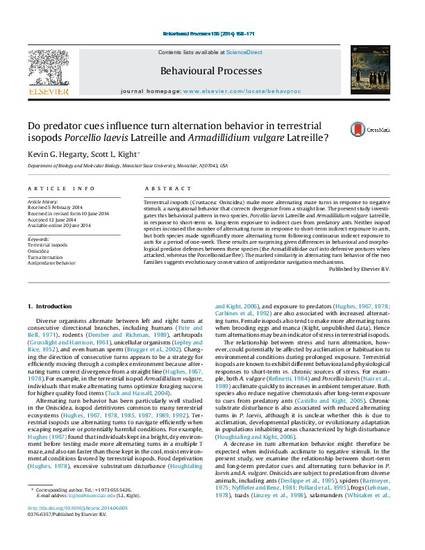
Article
Do Predator Cues Influence Turn Alternation Behavior in Terrestrial Isopods Porcellio laevis Latreille and Armadillidium vulgare Latreille?
Behavioural Processes
(2014)
Abstract
Terrestrial isopods (Crustacea: Oniscidea) make more alternating maze turns in response to negative stimuli, a navigational behavior that corrects divergence from a straight line. The present study investigates this behavioral pattern in two species, Porcellio laevis Latreille and Armadillidium vulgare Latreille, in response to short-term vs. long-term exposure to indirect cues from predatory ants. Neither isopod species increased the number of alternating turns in response to short-term indirect exposure to ants, but both species made significantly more alternating turns following continuous indirect exposure to ants for a period of one-week. These results are surprising given differences in behavioral and morphological predator defenses (the Armadillidiidae curl into defensive postures when attacked, whereas the Porcellionidae flee). The marked similarity in alternating turn behavior of the two families suggests evolutionary conservation of antipredator navigation mechanisms.
Keywords
- Oniscidea,
- terrestrial isopods,
- turn alternation,
- predator prey,
- behavior
Disciplines
Publication Date
Fall 2014
DOI
http://dx.doi.org/10.1016/j.beproc.2014.06.005
Citation Information
Scott Kight. "Do Predator Cues Influence Turn Alternation Behavior in Terrestrial Isopods Porcellio laevis Latreille and Armadillidium vulgare Latreille?" Behavioural Processes Vol. 106 (2014) p. 168 - 171 ISSN: 0376-6357 Available at: http://works.bepress.com/scott-kight/1/
